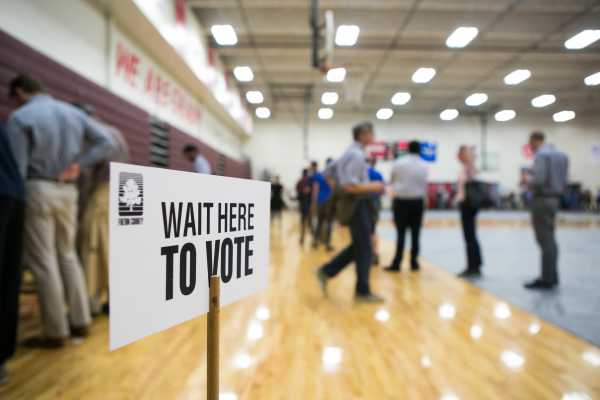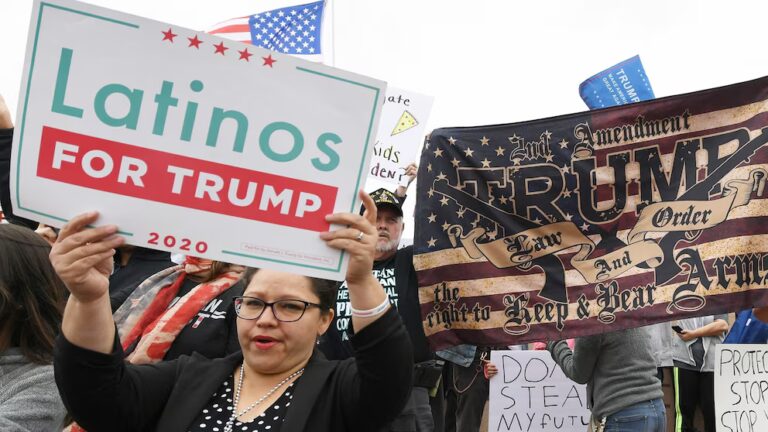
It’s been one month since Georgia’s high-profile governor’s race between Stacey Abrams and Brian Kemp, a contest which was marred by voting problems and accusations of voter suppression.
Now, a runoff election in the state is giving voters a chance to elect a new secretary of state to oversee the electoral process.
The results will be closely watched, mainly because of the drama that ensued during the governor’s race in November, when Brian Kemp, the Republican former secretary of state, ran against and eventually defeated Stacey Abrams, a Democrat and former state House minority leader.
In the weeks before the election, Kemp was repeatedly criticized for measures taken by his office and accused of suppressing minority voters, particularly black voters, in an effort to keep Abrams from winning the election.
The list of problems included voter purges, voter registrations that were put on hold, improperly functioning voting machines on Election Day, and an insufficient number of provisional ballots at precincts with large minority populations. And all the while, Kemp faced criticism for remaining as secretary of state and overseeing an election he was competing in.
When he won by a close margin, 50.2 percent of the vote to Abrams’s 48.8 percent, it intensified accusations that Kemp’s actions tilted the election in his favor, throwing the role and responsibilities of the secretary of state into the national spotlight. Civil rights groups, national politicians, and Abrams herself continued to accuse Kemp of voter suppression in the weeks following the contest.
On Tuesday, Georgians head to the polls to decide who will take Kemp’s former position and become the new secretary of state. The two candidates, Democrat and former US Rep. John Barrow and Republican state Rep. Brad Raffensperger, each failed to capture the required “50 percent plus one” majority of votes needed to win the election outright, sending the contest to a December runoff.
Coming weeks after the drama and controversy of the November gubernatorial contest, the runoff election is seen as a chance for voters to determine what they want the future of elections in Georgia to look like. And for voters of color, civil and voting rights groups argue that the election is a key part of a larger fight over minority voting rights in the state.
The candidates have very different visions for how to fix Georgia’s election system
Barrow and Raffensperger have very different takes on how to improve how people vote in Georgia, reflecting larger divisions between Democrats and Republicans on voting rights.
Barrow has largely focused on voting access, namely when it comes to ensuring that registered voters are not blocked from voting. He has cited concerns with the “exact match” process that compares registration information to Social Security and state driver records. And he has been especially critical of voter purges, which removed more than a million voters from the rolls in the past few years, saying that the state should try harder to contact infrequent voters before removing them.
“It should not be easier to get kicked off the rolls as an honest citizen minding your own business than it is to get your water turned off,” he recently told the Atlanta Journal-Constitution. “They’ve been purged without their knowing about it, and their vote will not get counted. It’s happening to a lot of people, and that’s not acceptable.”
Raffensperger, meanwhile, thinks that combatting voter fraud (which has not been an issue in recent elections in the state) and preserving election integrity through strict voting measures is the main issue. He’s proposed a system that would increase training for county-level elections officials, but would leave many things, like the voter purges unchanged from Kemp’s tenure. He has been endorsed by Kemp and President Donald Trump, who recently tweeted that the candidate would be “fantastic” for the state.
The policy proposals reflect the heated disagreements between Kemp and Abrams that animated the final weeks of the Georgia election. But the rhetoric over the impact of voting restrictions has not been as forceful in this race, a development that likely has a lot to do with the candidates.
Barrow is a former US Congress member who lost reelection in 2014 after his district was redrawn to help Republicans. At that time, Barrow was the last white Democrat representing the Deep South in the House. He has said that his experiences motivated him to run for secretary of state.
During this election cycle, Barrow campaigned as a moderate, stating his opposition to voting restrictions and highlighting his record on bipartisanship. He touted his record in Congress, noting that he worked with Republicans to “cut taxes and wasteful spending.” As Barrow put it in a campaign ad this year, “Yeah, I’m a Democrat, but I won’t bite ya.”
He’s adopted less forceful language than Abrams and her allies when it comes to remedying voting issues. According to the New York Times, Barrow does not support demands for Georgia’s voting measures to be placed under federal review, arguing that the state can adequately provide oversight.
Raffensperger, meanwhile, has dismissed many of Barrow’s criticisms, countering that those criticizing Georgia’s election system are using overblown and inaccurate arguments, and instead echoing Kemp’s claim that changes to the voting system would increase illegal voting. Barrow, he says, would “implement radical left-wing policies that undermine Georgia elections.”
Barrow has countered that there is zero evidence of fraud in the state, and that the risk of fraud is further mitigated by Georgia’s photo ID law.
One area where the candidates agree, at least somewhat, is election security. Though Kemp turned down the Department of Homeland Security’s offer to provide election and cybersecurity assistance before the 2016 election, the state has been criticized for data leaks that have exposed voter data.
In September, US District Judge Amy Totenberg ruled that Georgia could not be forced to adopt paper ballots before the election, but said there was “a mounting tide of evidence of the inadequacy and security risks” in the state’s system.
Both of the candidates have presented an alternative to Georgia’s currently paperless system, which has been deemed especially vulnerable to hacking as it lacks a paper backup. Barrow has proposed switching to a paper system with a machine counting submitted ballots, while Raffensperger has proposed a system that would still use the state’s touchscreen machines, but would create a paper copy of ballots after they’ve been filled out.
Voter turnout will be the determining factor in this election
Georgia’s voters turned out in droves in November, largely due to the high-profile gubernatorial race, and as the dust settled the secretary of state contest was too close to call. This time around the results will largely hinge on how many voters show up.
If a largely white and conservative electorate votes, Raffensperger is expected to win. But if the electorate is more diverse, and groups that Abrams worked to mobilize turn out, Barrow stands a better chance.
Historically, the electorate in runoff elections in the state has worked in Republicans’ favor. But this time around, groups like the Black Voters Matter Fund and the Abrams-founded New Georgia Project have been working to mobilize black voters. Abrams herself has gotten involved, releasing an ad in which she encourages support for Barrow.
“Georgians have another opportunity to demonstrate that they are ready to build a brighter state,” Abrams told reporters during a press call on Saturday. “Voters deserve leaders who will protect the sanctity of the vote — and that means we must elect Rep. John Barrow as secretary of state.”
But efforts to turn out voters, particularly black voters, have run up against some difficulties. Organizing groups have fewer resources than they had in the general election cycle. And with some voters expressing a belief that voter suppression — coupled with voting issues on Election Day — cost Abrams the election, it is possible that frustrations with the state’s election system have left some voters of color unconvinced that their votes will actually count.
”We’ve got to re-motivate some folks that were already disillusioned and frustrated after seeing an election stolen,” Cliff Albright, co-founder of the Black Voters Matter Fund, recently told the Washington Post.
Voting rights groups want to change policies in Georgia. The secretary of state election is a crucial part of that effort.
It’s worth noting that while Georgia’s secretary of state holds significant power, he or she is not the only elected official with influence over the state’s election system. County officials, for example, play a significant role in how elections are administered at the local level. And state legislators have influence over the passage of laws that can make it easier or harder to vote.
“They apply election law, they don’t make election law,” Kerwin Swint, a political science professor at Kennesaw State University, recently told the New York Times.
But in recent weeks, the secretary of state in particular has been singled out as a crucial part of changing the state’s election system. In the 2018 elections, Democrats flipped party control of secretary of state offices in Michigan, Arizona, and Colorado. A Barrow win in Georgia would be the biggest of these recent Democratic victories.
The December runoff comes more than two weeks after Abrams ended her campaign with a speech where she acknowledged that Kemp had legally won the race, but stopped short of conceding or saying that the election as a whole was legitimate. “I will not concede because the erosion of our democracy is not right,” she said at the time.
On November 27, a pair of groups allied with Abrams filed a lawsuit that seeks to overhaul the state’s controversial election system, arguing that it violated the constitutional rights of voters of color. To resolve this, the plaintiffs proposed reforms, including ending the use of electronic voting machines without a paper trail and stopping purges of infrequent voters.
That lawsuit is just one of several to challenge voting restrictions in Georgia in recent weeks. Before and after the 2018 election, lawsuits challenging parts of Georgia’s election system, like the exact match registration rule and the rejection of some absentee ballots, ended in victories for civil rights groups.
“We’ve been able to use the court systems to force some of these changes,” Abrams said on Saturday. But even with those developments, she says, “we need a leader who will do these voluntarily.”
Lawsuits take time, and it is unclear exactly when this recent challenge will be heard in court. In the interim, voters on Tuesday have a chance to determine what they want from the state’s election system.
Now it comes down to whose vision gets the most votes.
Sourse: vox.com






